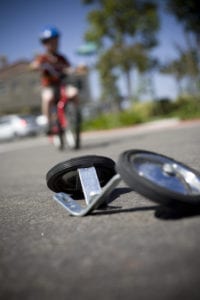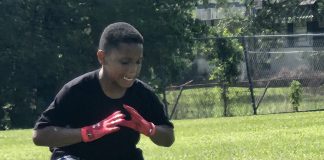Disclosure: This post is sponsored by Our Lady of the Lake.
Cultivating Competent and Confident Children
Our children learn and develop healthy life scoping skills when they’re given enough freedom to fail sometimes.
But helicopter parenting, the tendency to hover and become over-involved in a child’s life, is common among parents today. Well-meaning parents try to protect their child from consequences or failure, but may end up hindering development of their child’s competence and confidence.
We, as parents, need to learn when involving ourselves is a good or a bad thing. Sometimes we have to suppress that innate urge to fix everything.
Think of it as allowing your children to become the best version of themselves at each stage development: children, teens then young adults. A crucial part of this is letting them problem solve themselves, which helps them feel capable. If things don’t go well, let them try again. This will help aid them in becoming resilient, which is an essential life skill we can help them develop, says Kenneth R. Ginsburg, MD, author of Building Resilience in Children and Teens. Dr. Ginsburg’s books are an amazing tool because they help parents empower their children to grow and learn from life’s setbacks.
It’s important because doing everything for children hinders their growth. It’s like the old expression that it’s better to teach someone to fish rather than feeding them some fish for a day: is easing your child’s difficulty or burden today more valuable than allowing them to gain skills and tools that will empower them to bounce back from setbacks for a lifetime? Of course not. And they don’t effectively learn these crucial life lessons from lectures, ultimatums or constant directives. They learn from experience, trial and error, and watching you navigate your own difficulties.
So, why is it so hard to do this? Why do we go to such lengths to protect our kids from the very experiences that build character? Part of it is our desire to keep them safe, an instinct that does not go away when they reach adolescence and beyond. Most of us have an alarm that goes off when we feel our children may need our help. For example, you might hear that your teen’s friends were drinking or experimenting with drugs. Or when your baby girl, who’s actually 15, tells you she met a boy. Our alarm immediately goes off and we want to guide them to safety and prevent any potential bad decisions. This reaction can be a barrier to positive communication and effective parenting.
Sometimes stepping back, listening, and facilitating your child’s own problem solving is the best solution. This could range from doing nothing to role-playing various scenarios.
Now, obviously if your child is in imminent danger you need to step in appropriately – such as yelling and grabbing your toddler before they fall in a pool, or picking up your intoxicated teen from a party they drove to. There are some effective steps we as parents can take to support our children to become resilient and develop strong coping skills:
- Celebrate their wins. Give sincere positive feedback when they do something good. Find a few things or positive behaviors every day that your child deserves praise for and tell them how proud you are.
- Set reasonable expectations. Expectations should focus on the child and not the achievement itself. For example, expect them to work hard and celebrate studying as hard as they could, rather than only celebrating if they make an A.
- Emphasize their strengths. Identifying strengths is critical in difficult situations. Instead of calling your teen lazy for not cleaning their room, or putting off writing an essay or science project until the last minute, remind them of a situation where they worked hard and achieved a positive result. This reinforces that they are capable and it helps build confidence.
Confidence is critical for children and teens to know their strengths, expand their capabilities and move toward becoming independent and self-reliant young adults. Today, so many forces, intentional and unintentional, work to break down our children’s confidence and personal growth.
We as parents can’t fix everything, but we can try to remove ourselves from being unintentional forces, and resolve to build characteristics in our kids that will help them thrive well into adulthood.
Dr. Battley was recently featured on Our Lady of the Lake Children’s Health podcast ParentingU. He talked with pediatrician Dr. Courtney James about raising young tweens and teens. Listen to that episode HERE.





















